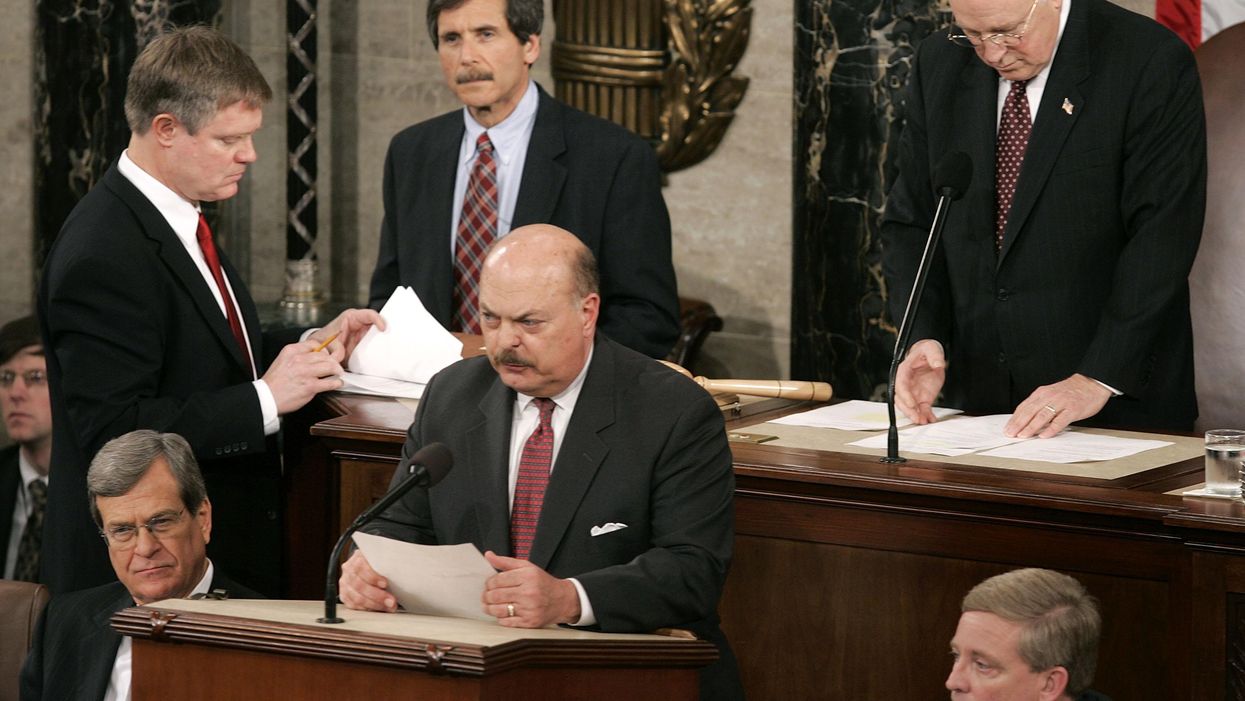A single senator now has the power to soil, but not spoil, the final step in what has been an extraordinarily challenged but ultimately by-the-book presidential election process.
That would happen if any one Republican in the Senate decides to join the final and surely futile protest promised by several of President Trump's most impassioned GOP allies in the House. They want to force every member of Congress to go on record in three weeks as to whether they back the losing candidate's baseless assault on the democratic process — at a moment when the winner is customarily accorded ceremonial but totally bipartisan respect as part of the peaceful transfer of power.
Avoiding those votes has become a new top priority for Senate Majority Leader Mitch McConnell. It's the main reason he ended 38 days of silent acquiescence in Trump's unfounded protests and declared it's time for the GOP to accept the reality of Joe Biden as the rightful president-elect.
After finally breaking with Trump on Tuesday, McConnell started pressing all the other GOP senators to sit on their hands Jan. 6, when Congress will convene to tabulate the electoral votes cast across the country on Monday.
Forcing roll call votes on Trump's fact-free allegations of fraudulent or legally faulty election counts would put dozens of GOP members in a political bind — between proving their loyalties to the president until the final hour, on the one hand, and sticking up for the integrity of the electoral process as well as the will of millions of their constituents.
McConnell's sudden change of tactics, to enforce a fragile hold on regular constitutional order after enabling the president's attacks on it, also has a more immediate motive: holding his fractured party together ahead of the twin Senate runoffs in Georgia, where partisan control of Washington hangs in the balance.
He is getting no help across the Capitol, where a small cadre of House Republicans led by Mo Brooks of Alabama plans to object to the electoral votes for Biden from at least five states — Arizona, Pennsylvania, Nevada, Georgia and Wisconsin — saying their results were fueled by widespread irregularities and malfeasance even though no court has yet found any credible evidence in any of them.
The joint session will convene the afternoon after the voting ends in Georgia, and the results there are likely to be so close that neither winner will be certain. And while Kelly Loeffler is holding her seat through an appointment that does not end until the special election is decided, the first term of her Republcian colleague David Perdue will have ended three days before — so there will be at most 99 senators in the room.
During the joint session, lawmakers are allowed to submit written objections to a state's Electoral College votes after their sealed envelopes are taken from ceremonial mahogany chests and opened, in alphabetical order, by Vice President Mike Pence. But he's supposed to rule them out of order unless the papers are signed by one member of both the House and the Senate. If that happens, the session is recessed for as long as two hours while the two chambers separately debate and vote on the objections.
That's only happened twice since the system was created in the late 19th century. The last time was in 2005, when a pair of Democrats who are no longer in office — Rep. Stephanie Tubbs Jones of Ohio and Sen. Barbara Boxer of California — lodged a formal challenge to Ohio's decisive 20 electoral votes for the re-election of President George W. Bush, alleging an array of irregularities in the state's election.
But unlike Trump now, Bush's opponent in that contest, Sen. John Kerry of Massachusetts, had conceded two month earlier and did not countenance the challenge. So it was rebuffed quickly and decisively, 74-1 in the Senate and 267-31 in the House.
Even the contested election of 2000, which Bush won only thanks to his disputed 537-vote margin of victory in Florida, did not produce a similar debate because the shouted objections to Florida's electors from several House Democrats were not echoed by any senators. It fell to the losing Democratic nominee, Al Gore, to move the proceedings along and eventually announce his own defeat in one of his final official acts as the outgoing vice president.
The three other vice presidents who lost national campaigns in the past six decades — Richard Nixon in 1961, Hubert Humphrey in 1969 and Dan Quayle in 1993 — have been put in a similarly awkward position but carried it out with stoic support for the democratic process.
The same challenge will soon confront Pence, who under the rules can expect to declare Biden the new president and Sen. Kamala Harris of California the new vice president with 306 electoral votes. But, unlike his predecessors, he earned his 232 electoral votes with a running mate who almost never admits to losing anything and who has displayed no interest in upholding such norms — or encouraging any of his subordinates to do otherwise.




















